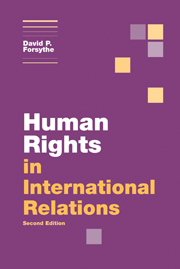Book contents
- Frontmatter
- Contents
- Preface to the second edition
- Preface to the first edition
- Part I The foundations
- Part II Implementing human rights standards
- 3 Global application of human rights norms
- 4 Transitional justice: criminal courts and alternatives
- 5 Regional application of human rights norms
- 6 Human rights and foreign policy in comparative perspective
- 7 Non-governmental organizations and human rights
- 8 Transnational corporations and human rights
- Part III Conclusion
- Index
4 - Transitional justice: criminal courts and alternatives
from Part II - Implementing human rights standards
- Frontmatter
- Contents
- Preface to the second edition
- Preface to the first edition
- Part I The foundations
- Part II Implementing human rights standards
- 3 Global application of human rights norms
- 4 Transitional justice: criminal courts and alternatives
- 5 Regional application of human rights norms
- 6 Human rights and foreign policy in comparative perspective
- 7 Non-governmental organizations and human rights
- 8 Transnational corporations and human rights
- Part III Conclusion
- Index
Summary
After gross violations of human rights, what is one to do? This is the subject of transitional justice, a growth industry for intellectuals and policy makers after the Cold War. Should one prosecute individuals in international courts, or in hybrid or special courts, or in national courts? Should one avoid courts and rely on truth commissions, or bar violators from public office, or just move on to concentrate on building a rights protective state in the future rather than looking back via criminal prosecution? There are many complexities facing those interested in international criminal justice – meaning those interested in whether to prosecute against the background of international human rights and humanitarian norms. Beyond punishment of evil doers, one needs to keep in mind other possible goals of transitional justice: deterring future atrocities, bringing psychological closure to victims and/or relatives, producing reconciliation among divided communities, building a rights protective polity in the future, adjusting to the lingering power of elements of the old regime.
In the last decade of the twentieth century the United Nations created two international criminal courts, the first in almost fifty years. Moreover a new International Criminal Court (ICC) came into legal existence in July, 2002. Furthermore, special courts were created in the aftermath of atrocities in Sierra Leone, East Timor, Kosovo, and Cambodia, while a new court was created by the interim government of Iraq after the US invasion and occupation of 2003 to try Saddam Hussein and his lieutenants.
- Type
- Chapter
- Information
- Human Rights in International Relations , pp. 89 - 120Publisher: Cambridge University PressPrint publication year: 2006



